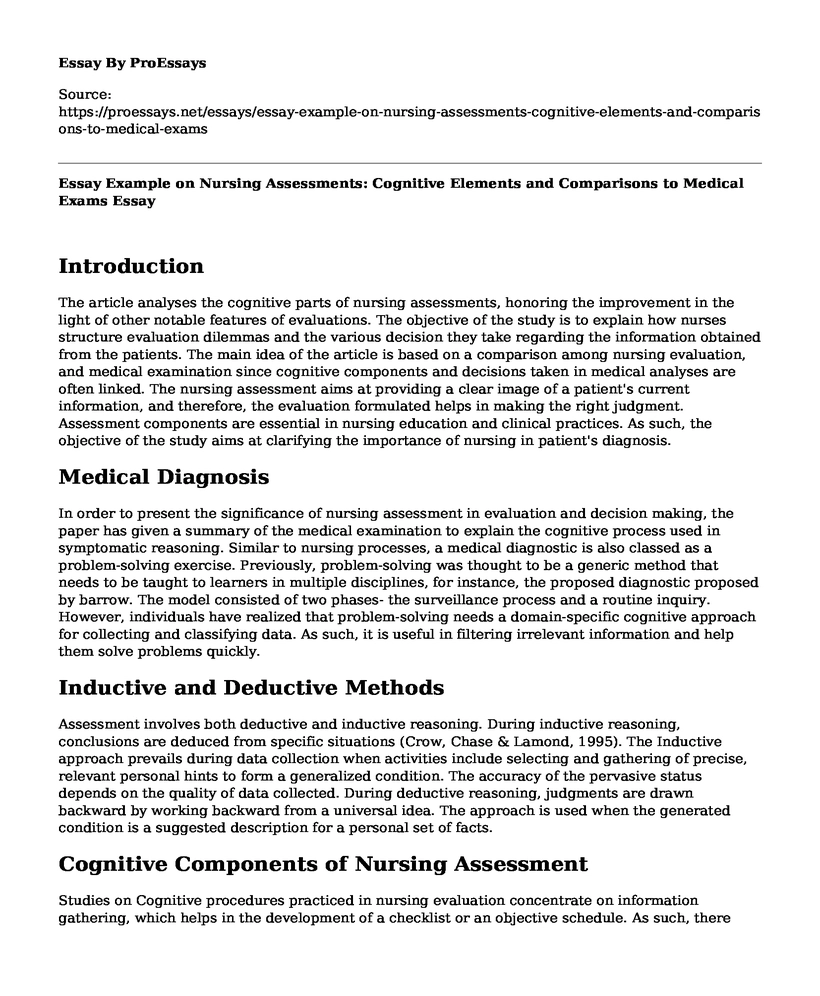Introduction
The article analyses the cognitive parts of nursing assessments, honoring the improvement in the light of other notable features of evaluations. The objective of the study is to explain how nurses structure evaluation dilemmas and the various decision they take regarding the information obtained from the patients. The main idea of the article is based on a comparison among nursing evaluation, and medical examination since cognitive components and decisions taken in medical analyses are often linked. The nursing assessment aims at providing a clear image of a patient's current information, and therefore, the evaluation formulated helps in making the right judgment. Assessment components are essential in nursing education and clinical practices. As such, the objective of the study aims at clarifying the importance of nursing in patient's diagnosis.
Medical Diagnosis
In order to present the significance of nursing assessment in evaluation and decision making, the paper has given a summary of the medical examination to explain the cognitive process used in symptomatic reasoning. Similar to nursing processes, a medical diagnostic is also classed as a problem-solving exercise. Previously, problem-solving was thought to be a generic method that needs to be taught to learners in multiple disciplines, for instance, the proposed diagnostic proposed by barrow. The model consisted of two phases- the surveillance process and a routine inquiry. However, individuals have realized that problem-solving needs a domain-specific cognitive approach for collecting and classifying data. As such, it is useful in filtering irrelevant information and help them solve problems quickly.
Inductive and Deductive Methods
Assessment involves both deductive and inductive reasoning. During inductive reasoning, conclusions are deduced from specific situations (Crow, Chase & Lamond, 1995). The Inductive approach prevails during data collection when activities include selecting and gathering of precise, relevant personal hints to form a generalized condition. The accuracy of the pervasive status depends on the quality of data collected. During deductive reasoning, judgments are drawn backward by working backward from a universal idea. The approach is used when the generated condition is a suggested description for a personal set of facts.
Cognitive Components of Nursing Assessment
Studies on Cognitive procedures practiced in nursing evaluation concentrate on information gathering, which helps in the development of a checklist or an objective schedule. As such, there have been little efforts to examine the judgments nurses make during the assessment, for instance, nurses often have to ascertain how frequently a patient needs to be monitored, or the extent of personal assistant the patient need (Crow, Chase & Lamond, 1995). The checklist can be liked to the menu-driven analysis of medical examination, and thus it is essential to consider different domain-specific knowledge structures nurses develop.
Domain-Specific Knowledge Structures
This approach organizes problems into wide sections by core ideas or through a set of procedural rules. Core concepts offer classes utilized to identify issues, for instance, which measures show the evaluation needed. Procedural rules provide a guideline for gathering and combining data. The Domain-specific knowledge structures, therefore, define the action to be taken; for instance, nurses skilled at monitoring diabetes patients can judge whether they are stable, which is different from nurses monitoring myocardial infarction patients. Domain-specific structures also referred to as intuition, helps in problem-solving in cognitive science through the inclusion of perceptual knowledge and recognition capabilities when tackling situations.
Assessments as Judgments
The analysis identifies a problem solver as an individual who needs something but does not know the direction to take to get it. As such, the need represents the required solution, and the set of actions represents the cognitive approaches. In a clinical setting, the answer is a diagnostical judgment that embodies the appropriate decision for the intervention needed in managing a patient's situations. Nurse judgment is the estimate of a patient's condition or circumstance; for instance, a nurse can conclude that a patient is in a worse, better, or the same situation as before. Generally, nurses collect information about a patient, for instance, post-operative patients to plan and predict the needed intervention plan in providing quality care
General Discussion
The need to understand patients as a person is significant in nursing education, and it helps in individualizing care. Besides, it helps develop the knowledge needed in collecting and classifying data about the patient. As such, knowing the patient is a valuable step in clinical assessment and reasoning.
Cognitive analysis and diagnosis are both predictive and help in forming the basis of decision making. However, the two vary with medical diagnosis aiming at explaining the patient's signs and symptoms. On the other hand, nursing assessment aims at offering a clear picture of a patient's current situation
Positional StatementCognitive nursing assessment is a significant step in examining the patient's medical conditions to determine the direction of providing quality care. The ability to judge and make the best reasoning through intuition and intellectual ability assist in making informed decisions. Besides, cognitive analysis and assessment in the clinics are useful in decision making since it informs doctors about a patient's situation and whether his condition is improving or worsening. As such, cognitive clinical assessment is a fundamental step in the health sector
References
Crow, R. A., Chase, J., & Lamond, D. (1995). The cognitive component of nursing assessment: an analysis. Journal of Advanced Nursing, 22(2), 206-212. doi:10.1046/j.1365-2648.1995.22020206.x
Cite this page
Essay Example on Nursing Assessments: Cognitive Elements and Comparisons to Medical Exams. (2023, Mar 02). Retrieved from https://proessays.net/essays/essay-example-on-nursing-assessments-cognitive-elements-and-comparisons-to-medical-exams
If you are the original author of this essay and no longer wish to have it published on the ProEssays website, please click below to request its removal:
- Annotated Bibliography Example on Ethical Issues in Medicine
- The Outcomes of Weight Loss-based Diet on HbA1C in Patients with Diabetes Mellitus
- The Effects of Smoking Essay
- Research Paper on Issue of Shortage of Nurses in the Health Care System
- HIV Virus Essay Example
- Research Paper on Vaccine Hesitancy: A Global Health Threat in the XXI Century
- Global Political Economy in Disarray: Pre- & Post-COVID-19 - Essay Sample







